Transparent product information
Circular No. 02, dated March 28, 2024, regulating the management of traceability of products and goods issued by the Ministry of Science and Technology (effective from June 1, 2024) requires organizations and individuals engaged in production, business and service activities to trace the origin of non-agricultural goods to ensure at least 10 pieces of information, such as: Name, image of product, goods; name, address of production and business unit; stages (clearly stating product traceability code, location traceability code, traceability time of each stage); brand, trademark, symbol code, product serial number (if any); applied technical standards and regulations...
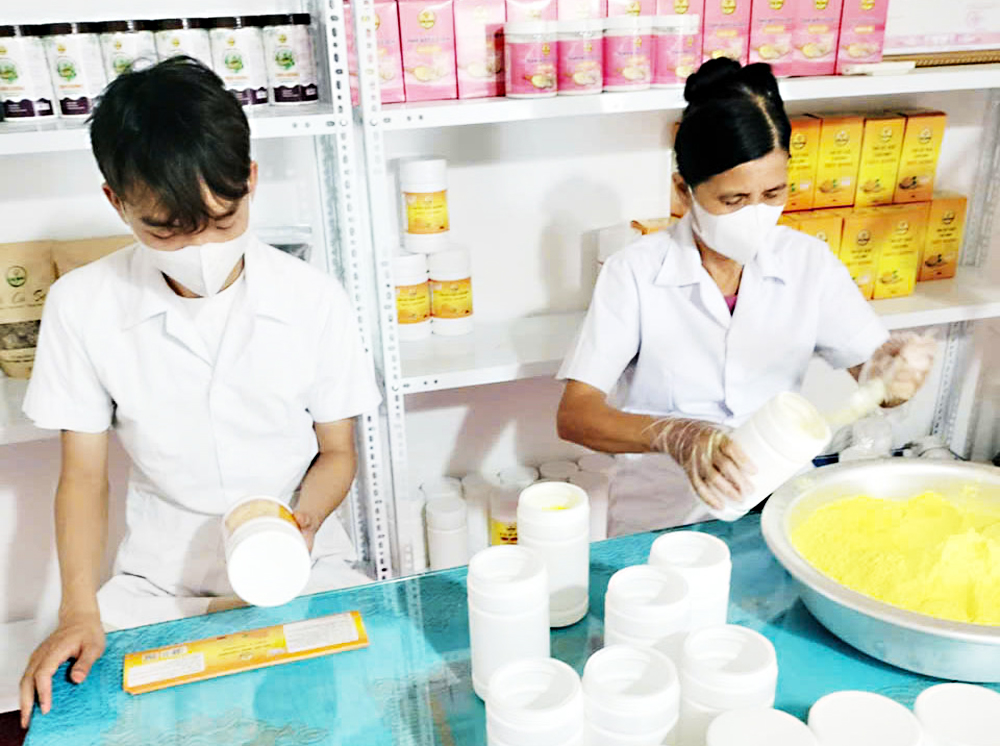 |
Thuy Duong Clean Agriculture Cooperative focuses on product traceability. |
At the same time, agricultural products must also apply the traceability system according to Circular No. 17 dated December 20, 2021 of the Ministry of Agriculture and Rural Development (now the Ministry of Agriculture and Environment ) regulating the traceability, recall and handling of unsafe food. Accordingly, production facilities apply the "Internal control process for product traceability" through the system of books and forms deployed and guided by the Department of Agriculture and Environment.
Realizing the importance of traceability and adhering to current regulations, many enterprises, cooperatives, and production households in the province have focused on registering, creating barcodes, QR-Codes, and fully recording the "path" of creating products according to the motto "one step ahead, one step behind". According to information from the Department of Science and Technology, the whole province has 415 OCOP products with 3 stars or more from enterprises and cooperatives, of which most of the products have information posted on the province's traceability portal.
Thuy Duong Clean Agriculture Cooperative (Nham Bien Ward, Bac Giang City) is one of many units that have performed well in the above tasks. Ms. Bach Thi Men, Director of the Cooperative, said that on average, each year, the unit purchases from its members about 10 tons of lotus root, 10 tons of cassava, 15 tons of turmeric, etc. The Cooperative has a contract signed with the supplier, requiring that all raw materials have no residual pesticides and ensure quality as required.
Purchase and sale activities are carefully recorded through a system of tables and books and are confirmed by the Commune People's Committee that the raw materials have been purchased locally. All products of the Cooperative such as turmeric starch, sprouted cereals, lotus root starch, turmeric and honey pills... have full codes, barcodes, and traceability stamps on the packaging.
State, businesses and people join hands
In recent times, product traceability has received attention from authorities at all levels, departments, business communities, as well as active support and cooperation from consumers. However, this activity still faces some difficulties. According to the assessment of the Department of Science and Technology, a number of consumers are not in the habit of carefully researching product information when purchasing. Some establishments have not strictly implemented regulations on traceability, especially small-scale establishments. The province is maintaining the operation of the Provincial Traceability Portal (address: https://txng.bacgiang.gov.vn) but has not yet connected to the national traceability system.
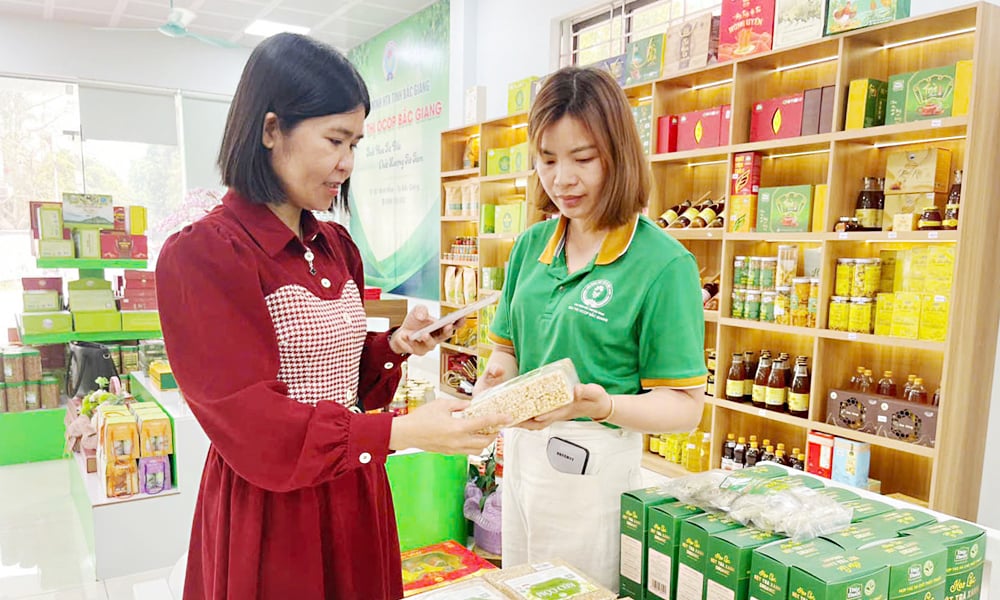 |
Consumers scan QR-Code to find out product information. |
Overcoming difficulties, localities, departments and branches continue to effectively deploy, apply and manage the traceability system. The goal by the end of 2025 is that the province strives to have at least 30% of enterprises, cooperatives, production and service establishments using codes and barcodes with traceability systems applying national and international standards; 100% of export products and goods belonging to key, typical, potential and OCOP groups apply the traceability system.
| Bac Giang strives to have at least 30% of enterprises, cooperatives, production and service establishments using codes and barcodes with traceability systems applying national and international standards by the end of 2025; 100% of export products and goods belonging to key, typical, potential, and OCOP groups applying traceability systems. |
In 2025 and the following years, the Department of Science and Technology will continue to guide and support production entities in registering codes, barcodes, and QR-Codes; synchronizing technology infrastructure to connect the provincial Origin Traceability Portal with the national one. The Department of Agriculture and Environment will pay attention to directing specialized departments to guide entities in applying the "Internal control process for product origin traceability".
Mr. Do Van Huy, Head of the Department of Professional Affairs, Department of Economic Cooperation and Rural Development (Department of Agriculture and Environment) said that the internal control process for product traceability has been recognized as an initiative that can be replicated in the province. Currently, the professional department is actively guiding subjects, especially subjects participating in the development of OCOP products in 2025, to clearly understand how to record information in the table system (from care, harvesting, preliminary processing, processing, packaging to sales). Importantly, each organization and individual producing and trading must uphold a sense of responsibility and be proactive in tracing the origin of products to affirm their reputation and position in the market.
The Provincial Cooperative Union continues to maintain the software for managing the production and business activities of cooperatives in the province to support verification and post-checking of product quality when introducing and consuming on the Internet. At the same time, it supports cooperatives with OCOP products with clear product traceability to participate in trade promotion programs and fairs. For example, Hiep Hoa district continues to provide free support for organizations and individuals to trace the origin on the website http://hiephoaocop.vn.
“To make traceability activities practical, it is necessary to have the cooperation and cooperation of consumers. When choosing any product, consumers should take the time to carefully research the product information through barcodes, QR-Codes, and purchase from reputable units. If they discover a product with unclear information or poor quality, they should report it to the manufacturer, market management force, and the Consumer Rights Protection Association for timely support and handling,” added Mr. Nguyen Van Xuat, Chairman of the Provincial Consumer Rights Protection Association.
Source: https://baobacgiang.vn/truy-xuat-nguon-goc-san-pham-de-tang-suc-canh-tranh-postid415857.bbg






![[Photo] President Luong Cuong receives Prime Minister of the Kingdom of Thailand Paetongtarn Shinawatra](https://vphoto.vietnam.vn/thumb/1200x675/vietnam/resource/IMAGE/2025/5/16/52c73b27198a4e12bd6a903d1c218846)
![[Photo] Prime Minister Pham Minh Chinh and Prime Minister of the Kingdom of Thailand Paetongtarn Shinawatra attend the Vietnam-Thailand Business Forum 2025](https://vphoto.vietnam.vn/thumb/1200x675/vietnam/resource/IMAGE/2025/5/16/1cdfce54d25c48a68ae6fb9204f2171a)
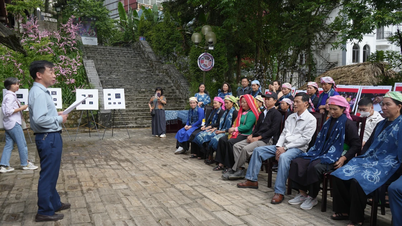





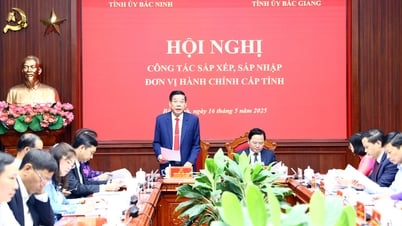










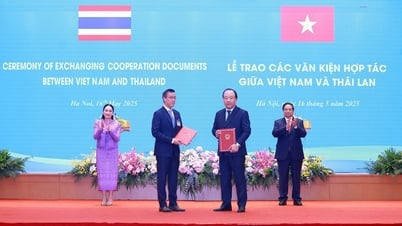
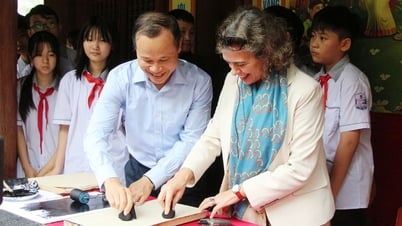

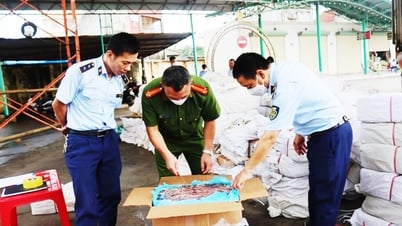







































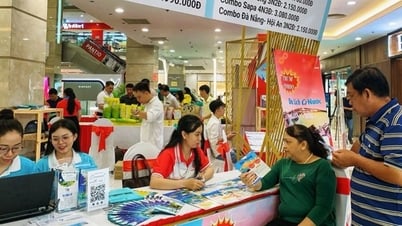

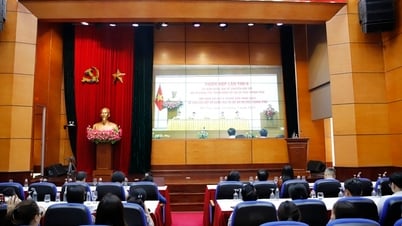







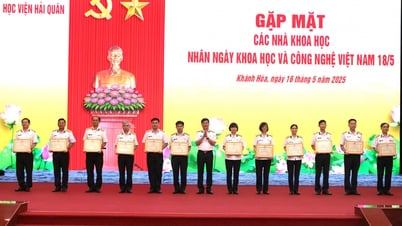

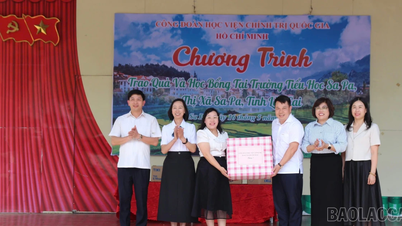











Comment (0)